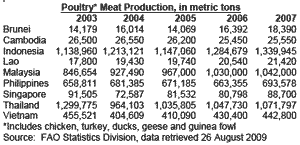



International Egg and Poultry Review
GLOBAL - By the USDA's Agricultural Marketing Service (AMS). This is a weekly report looking at international developments concerning the poultry industry. This week's report focuses on future US trade with ASEAN and the implications of the discovery of the H1N1 influenza virus in turkeys.Association of Southeast Asian Nations (ASEAN)
At the ASEAN Summit in July 2009, Secretary of State Hillary Rodham Clinton announced the US intention to open a mission to ASEAN in Jakarta with a resident Ambassador. The Association of Southeast Asian Nations (ASEAN) includes 10 countries with a combined population of 584 million people and an international merchandise trade of $1,710.4 billion in 2008. US trade with ASEAN countries totaled $182 billion in 2008 in two-way trade.
Indonesia, Malaysia, Philippines, Singapore and Thailand formed ASEAN in 1967. Membership in ASEAN grew to include Brunei Darussalam (1984), Vietnam (1995), Lao PDR and Myanmar (1997) and Cambodia (1999). The aims of the Association are (1) to accelerate economic growth, social progress and cultural development in the region and (2) promote regional peace and stability through respect for justice and the rule of law.

ASEAN has Free Trade Agreements with China, Japan, Korea, and Australia and New Zealand. The ASEAN-India Trade in Goods Agreement was concluded in August after six years of negotiations and will enter into effect on 1 January 2010 once India and at least one ASEAN Member State notify completion of their internal ratification process.
US poultry meat exports to the ten ASEAN countries totaled 127,185 metric tons valued at $146 million in 2008. For the first half of 2009 exports to ASEAN countries 63,667 metric tons valued at $66 million. Vietnam is our largest market in ASEAN. The bulk of US poultry meat exports to Vietnam consisted of frozen chicken cuts and offal.

Source: Office of the United States Trade Representative; US Department of State; Association of Southeast Asian Nations; Department of Commerce, US Census Bureau, Foreign Trade
H1N1 in turkeys
Chile reported an outbreak of H1N1 to the World Organization for Animal Health (OIE) on 21 August 2009. The virus was detected in breeder turkeys after workers noticed a drop in egg production and a reduction in shell quality.
The affected farms were systematically monitored through the Official Health Surveillance Program, which is in place for the early detection of the diseases that affect poultry flocks. Once the drop in egg production was noted the company activated the work protocol established for these cases. The facilities were quarantined and disinfected, but affected birds were not treated or culled. Serotyping allowed exclusion of the presence of H5 and H7 viruses and allowed confirmation of the detection of A/H1N1 2009 pandemic influenza virus.
Outbreaks were reported at two locations. Both are breeding turkey operations owned by the same company. The farms are vertically integrated operations with biosecurity measures in place. Some birds had been exposed to people showing respiratory symptoms prior to drop in egg production The breeding stock was back to normal egg production levels in less than three weeks from the initial outbreak. Vaccination is not allowed in Chile. FAO’s interim Chief Veterinary Officer Juan Lubroth said “once the sick birds have recovered, safe production and processing can continue. They do not pose a threat to the food chain.”
This is the first time the virus has been detected outside of humans and pigs. Three countries have reported cases of H1N1 in pigs: Canada, Argentina, and Australia. The H1N1 virus was first seen in March, 2009 and has since been detected in about 180 countries. The H1N1 virus has only caused mild symptoms in turkeys and pigs.
The Center for Disease Control (CDC) lists the 2009 H1N1 influenza virus as the dominant influenza virus in circulation in the world.
In a CDC Joint Briefing with NIH and FDA on 2009 H1N1 Influenza, Dr Anthony Fauci, the Director of the National Institute of Allergy and Infectious Diseases at the National Institutes for Health (NIH) said: "It's not surprising we see this infecting turkeys because the bird, swine, human access with influenza is well-established…so the report of turkeys being affect in Chile, although it's of interest, did not raise any great concerns among us."
Source: OIE WAHID Disease Information; CDC Joint Briefing with HIH & FDA on 2009 H1N1 Influenza; Centers for Disease Control; FAO Newsroom; UN Influenza.org; news wires
Further Reading
| - | You can view the full report by clicking here. |











